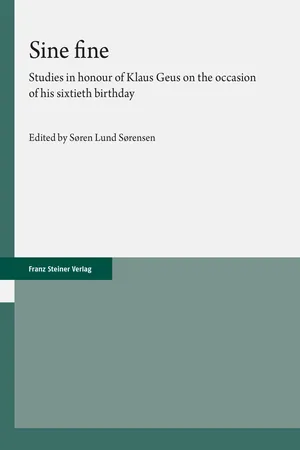
Sine fine
Studies in honour of Klaus Geus on the occasion of his sixtieth birthday
- 578 pages
- English
- PDF
- Available on iOS & Android
Sine fine
Studies in honour of Klaus Geus on the occasion of his sixtieth birthday
About this book
For more than a decade Klaus Geus has held the Chair for the Historical Geography of the Ancient Mediterranean at Freie Universität Berlin, during which he has continuously explored new ways in the study of the Greek and Roman world. Through his immense scholarly output and his extensive network, he has established himself as one of the foremost experts on historical geography.
The present collection of articles by thirty-one scholars from various disciplines is dedicated to Klaus Geus on the occasion of his sixtieth birthday. In line with Klaus Geus' research interests the articles of this Festschrift take the reader on a journey from the imperial court along the Roman roads into the provinces and far beyond the confines of the Mediterranean to the edges of the oikumene: India and Taprobane – Yemen and Ethiopia. On this odyssey through the ancient world particular attention is paid to common sense geography, and Herodotos, Mela, Ptolemy and Strabon are but a few of the Greek and Roman authors accompanying the reader.
Frequently asked questions
- Essential is ideal for learners and professionals who enjoy exploring a wide range of subjects. Access the Essential Library with 800,000+ trusted titles and best-sellers across business, personal growth, and the humanities. Includes unlimited reading time and Standard Read Aloud voice.
- Complete: Perfect for advanced learners and researchers needing full, unrestricted access. Unlock 1.4M+ books across hundreds of subjects, including academic and specialized titles. The Complete Plan also includes advanced features like Premium Read Aloud and Research Assistant.
Please note we cannot support devices running on iOS 13 and Android 7 or earlier. Learn more about using the app.
Information
Table of contents
- Contents
- Tabula gratulatoria
- Prefacev
- (Manuel Albaladejo Vivero) La India en la obra de Pomponio Mela
- (Gonzalo Cruz Andreotti) Estrabón e Iberia
- (Mounir Arbach) Une caravane du roi de Sabaʾ à Ḥimā Najrān
- (Pascal Arnaud / Sylvain Colin / Quentin Poterek / Ferréol Salomon) Les alignements de points dans la construction des mers chez Ptolémée
- (Mathieu de Bakker) Strabon and the edges of the oikoumenē
- (Ernst Baltrusch) Mommsens Staatsrecht und der römische Prinzipat
- (Tønnes Bekker-Nielsen) Roads and landmarks in Strabon’s Geography
- (Konstantin Boshnakov) Rethinking the Danube-tributary account in Herodotus 4,48–51
- (Kai Brodersen) Ausbildung, Förderung und Vorbild
- (Gian Franco Chiai) Wie man am Kaiserhof spricht
- (Omar Coloru) There and back again. Apollonios of Tyana’s journey to India
- (Isabelle Draelants / Thomas Falmagne) L’épisode véronais du Liber Nemroth?
- (Kurt Guckelsberger) Structure and origin of the Tabula Peutingeriana
- (Victor Gysembergh) Une traduction du Tractatus de Spera de Jean de Sacrobosco par Maxime Planude ou son entourage
- (Matthäus Heil) Agrippinas Tod
- (Carsten Hoffmann) Das Prasodische Meer bei Ptolemaios und anderen
- (Mohammed Maraqten) Himyarite diplomatic missions to Bilād al-Shām and Mesopotamia in the light of a Sabaic inscription
- (Didier Marcotte) Ὠφέλιμόν τι χρῆμα περιήγησις
- (Ivan Matijašić) Common sense geography nelle iscrizioni greche di età ellenistica
- (María Engracia Muñoz-Santos) Cuando Augusto perdió su cabeza por una mujer
- (Silvia Panichi) Gli altri nomi antichi di Taprobane
- (Stefanie Rudolf) Two Ethiopias – mira quaedam confusio
- (Kai Ruffing) Utopie und Wirtschaft
- (Daniele Salvoldi) The Island of Meroe
- (Carmen Sánchez-Mañas) Frauenraub, Mord und Erdkunde
- (Pierre Schneider) Cognitive maps, landmarks and landscapes
- (Søren Lund Sørensen) From the Hydaspes to Gaul
- (Giusto Traina) Who was Strabo’s father?
- (Rainer M. Voigt) Das Altäthiopische im Vergleich mit dem Tigrinischen und Tigre
- (Zeus Wellnhofer) Zur äthiopischen Übersetzung von Abū Šākirs Kitāb at-Tawārīḫ
- (Wolfgang Will) Über die Böswilligkeit des Historikers
- Select list of publications of Klaus Geus
- Index fontium